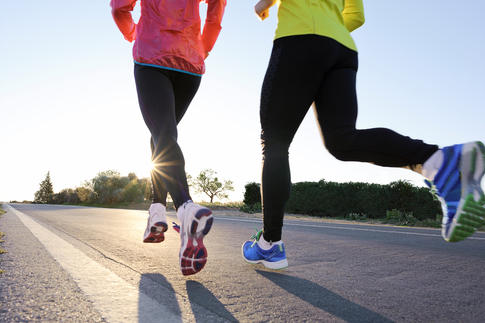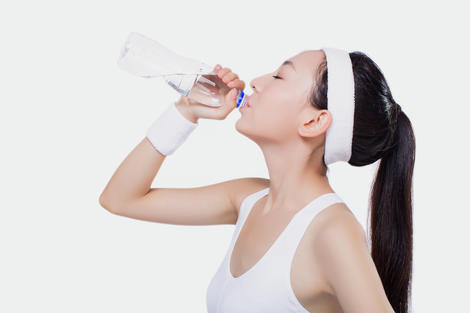It is not uncommon right now to hear about Olympians consuming thousands of calories to fuel their competitions and practices. Depending on the sport, level of endurance training and body composition of the athlete, as many as 5,000-10,000 calories are consumed on a competition day! For an athlete, exercise is their career, and it requires a high level of discipline and attention to their nutrition. However, for most of us, exercise is a practice we do 5-6 times per week and therefore our nutritional needs are different. So, while we are glued to our tvs and smart devices watching Olympians down sports drinks, chew high energy bars and suck glucose gels before, during and after events, it is important for us to keep a healthy perspective on how to fuel our workouts so that we achieve our fitness and weight management goals.
Take a look around the gym and you will see a combination of sports drinks and water bottles. Some gyms also have a juice or smoothie bar available to members. What should you be drinking? Do you need to gulp a protein shake before your weight lifting session? What about eating an energy or protein bar before or after a workout? If you are training for a race do you need to try some gels or goos to power through your mileage?
Many people get caught up in the exercise vibe and fitness lingo. Manufacturers spend millions, if not billions of dollars researching trends and then marketing their products using specific language to convey a message of health- what we all want, right? But, there is a lot of misinformation out there about what we should and should not be eating to fuel our exercise program.

A Registered Dietitian Nutritionist (RD or RDN) is your best source of science-based nutrition information and some dietitians have an additional certification in Sports Nutrition (CSSD- Certified Specialist in Sports Dietetics) that can offer even more support and specific recommendations for those that are training for a competition. Today, I want to share some general guidelines and information about how to fuel your body so you are feeling fit and fantastic after every workout.
KNOW YOUR GOALS
It is important to identify what your goals are in terms of exercise, fitness and weight. If your goal is weight loss, then consuming a snack, drink, protein shake or smoothie before or after a work out that repletes ALL of the calories you just burned, you will not likely see your desired results on the scale. If your goal is to generally maintain your weight, but improve muscular definition and build lean body mass, consuming enough quality calories for body weight maintenance is fine.
Exercise does not always necessitate additional calories in your daily meal plan. Sometimes it is rearranging the timing of your meals so that you have adequate fuel (energy) exactly when you need it. You may not need to grab the 250 calorie “energy bar” and instead, move your healthy snack or meal around to make your nutrition work for you, not against you. No one wants to work hard and sweat for nothing!
BEVERAGES TO DRINK
Hydration is absolutely critical. Whether you are an athlete, weekend warrior, seasoned exercise veteran or work out newbie, everyone needs adequate water. Research shows that thirst is actually a sign that you are already headed towards dehydration. The exercise you do and the intensity with which you do it contributes to how much you sweat through the exercise. Most individuals are not going to weigh themselves before and after exercise to assess how much body water they lost, but if you decide to and see more than 1% loss (2+ pounds for a 200# person), this indicates dehydration and therefore the need to replete the water loss with fluids.
Are you drinking enough? Below are some guidelines for how to hydrate:
Before Exercise: Drink 16-20oz water at least 4 hours before exercise
During Exercise: Drink 3-8oz water every 15-20 minutes when exercising less than 1 hour
After Exercise: Drink 20-24oz water or sports beverage for every 1 pound of body weight lost during the workout.

It’s a fact that 12oz Gatorade has 80 calories. If you drink the full 32oz bottle, you are consuming more than 200 calories! Gatorade and similar beverages are not bad and in fact, very useful for athletes and those training for competitions- these beverages are formulated to replace electrolytes lost through sweat and carbohydrate (sugar) burned for fuel. But they ARE NOT necessary if exercising less than 60 minutes during a workout routine. Research has shown that the unnecessary use of sports drinks by adults and children is linked to weight gain. The best way to rehydrate after a 30 minute run, 45 minute walk or a 45-60 minute class at the gym is water- plain and simple… easy and always available… exactly what your body needs.
A fantastic way to give your body a boost of electrolytes (sodium, potassium) and some additional nutrients are fruits and vegetables. By including these at your next meal or snack you are treating your body kindly for all the work it endured. Yes, contradictory to the messages we often hear from media and ads, electrolytes are found in real food.
MEAL TIMING
A healthy, balanced meal will provide energy (fuel) for 3-5 hours, depending on the quality of the calories (processed vs. whole foods with fiber) and the macronutrient distribution (carbs, protein, fat). Therefore, planning to workout on an empty stomach or 4-5 hours after a meal means you will generally have less energy and endurance for your exercise. Not only is it important to consider the timing of your meals but also the contents because what you consume affects your energy levels. Choosing processed foods, sugary beverages/snacks or even high fat/heavy foods can leave you feeling lethargic when it is time for exercise. That’s not very motivating!
While every body is different, the general rule is to eat within 1-3 hours pre-workout. Eating directly before exercise can cause GI discomfort because your stomach is digesting food while your muscles are working and according to the Academy of Nutrition and Dietetics, “these competing demands are a challenge for optimal performance.”
Whether you exercise first thing in the morning, after work or somewhere in the middle, it is ideal to eat a pre-workout meal that includes complex carbohydrate with a little bit of protein as well. Too much fat or protein at a meal or snack will prolong the digestive process and can squelch your performance. Here are some mini meal fueling ideas that won’t sabotage your weight goals:
-
1oz low fat cheese/cheese stick with ½-1 serving of 100% whole grain crackers
-
1 slice 100% whole grain or sprouted grain bread (like Ezekiel brand) with 1 tablespoon natural nut butter
-
1 serving fruit with 4-6oz low fat greek yogurt
-
1 serving edamame beans lightly sprinkled with salt
-
1 small fruit (or 1 cup berries) with ½-1oz nuts
-
½-1 fruit and nut bar (like Larabar)
AFTER EXERCISE
Nourishing your body after exercise is also important as it helps replenish glycogen stores and rebuild and repair muscle tissue damage. Your muscles become more sensitive towards nutrients during exercise and there is a 30 minute window post-workout that is the ideal time to nourish your cells with a flood of nutrients. Your muscles gradually reduce sensitivity over time but after resistance training they may stay sensitive for many hours. If you have a meal planned following your workout, this is perfect, but if a meal will be delayed by several hours, a refuel snack may be necessary. Make sure this snack has some protein along with some carbohydrate as well. Protein provides amino acids, (aka “building blocks”), to repair tissue damage and strengthen muscles.
Protein supplements are not necessary for post-recovery for most individuals. Simply including a piece of fish with dinner or eating 6-8 ounces of greek yogurt following a workout may be sufficient. Some athletes use protein supplements due to sheer convenience and ease. A Sports Dietitian can provide specific macronutrient recommendations based on the individual, activity performed, intensity and body composition.
Protein supplements do not need to be demonized or praised. They are a vehicle for supplying the body with protein, but not all supplements are created equal. Check the ingredient list thoroughly for added sugars, artificial sweeteners and foreign ingredients. Some brands have even been found to have traces of heavy metals that are toxic in large quantities. Talk with a Registered Dietitian for assistance choosing a product that is third party tested and contains quality ingredients that support your health and fitness goals.
<pstyle=”font-size: 16px;” class=”font_9″>CONCLUDING THOUGHTS
Remember that food is fuel. A car not only needs fuel, but the right type of fuel in order to perform well. Exercise has dozens of benefits, but wise food choices enhances these benefits. Stay attune to your body and how it responds to different foods you fuel with before and after exercise. No doubt, there will continue to be supplement and food trends that claim to make you look and feel amazing. But the reality is that real, whole foods and pure water are sufficient for most exercisers. If you are training for a competition or an athlete that needs some additional nutrition guidance, a Certified Specialist in Sports Dietetics can be a great benefit!
Go run, walk, dance, lift, jump, throw, step or whatever other activity that you find fun, but don’t leave without the proper fuel… you might find yourself stranded, on empty.
TRUTH: Let your eyes look straight ahead; fix your gaze directly before you. Give careful thought to the paths for your feet and be steadfast in all your ways. Do not turn to the right or the left; keep your foot from evil.
Proverbs 4:25-27
References
https://www.acsm.org/docs/brochures/selecting-and-effectively-using-hydration-for-fitness.pdf
http://www.todaysdietitian.com/newarchives/111609p18.shtml
http://www.kickthecan.info/sites/default/files/documents/Rudd_SSB_SportsDrinks_Fall2010.pdf
http://www.eatright.org/resource/fitness/sports-and-performance/fueling-your-workout/tips-for-fueling-your-workout-without-over-doing-it
http://www.todaysdietitian.com/newarchives/110413p18.shtml
http://www.eatright.org/resource/fitness/sports-and-performance/fueling-your-workout/protein-and-the-athlete
